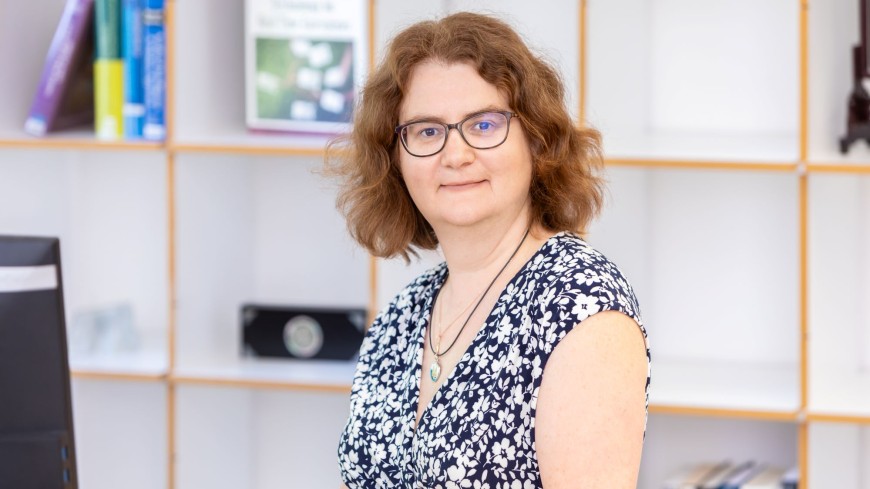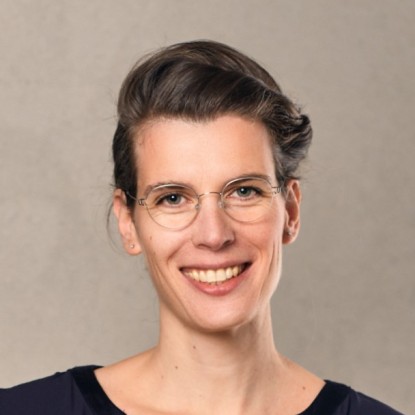Award for outstanding achievements in computer science
TU Professor Iryna Gurevych receives prestigious Royal Society Milner Award
2024/08/28 by Michaela Hütig
TU computer scientist Iryna Gurevych is the first female scientist in Germany and the first female university professor to receive the prestigious Milner Award from the British Royal Society. The researcher is being honoured for her significant contributions to automatic language processing and artificial intelligence, which “combine a deep understanding of human language and cognitive abilities with the latest paradigms in machine learning”, as the world's oldest independent scientific academy announced in London. Gurevych heads the Ubiquitous Knowledge Processing (UKP) research group at the Department of Computer Science at the Technical University of Darmstadt.

The winner of the award expressed her delight at receiving the honour. I am proud that my work has made a contribution that is now being recognised by the Royal Society,' said Iryna Gurevych, the first university professor to receive the Milner Award. The award brings visibility to European machine learning and natural language processing and recognises the hard work of my team over the years. The Milner Award will help attract young talent to my team, which is an important success factor in our field of science. I am honoured, humbled and grateful to my team, mentors and colleagues.
Gurevych's field of research, artificial intelligence (AI), has drastically changed the world in recent years. In particular, immense progress has been made in Natural Language Processing (NLP) – an area of AI that includes Large Language Models (LLMs) such as the ChatGPT chatbot – and tools have been developed that can understand and generate human speech with impressive accuracy. These tools are now being used in applications as diverse as translation, search and conversation.
Pioneer of NLP research
As a scientist, research leader, mentor and science communicator, Gurevych has made significant contributions to the success of NLP. She was one of the pioneers to use Wikipedia as a rich data source for language processing in her early work, and was responsible for groundbreaking research on neural network-based text representations and parameter-efficient fine-tuning of large, pre-trained transformer models such as BERT, which form the backbone of today's NLP technology.
The Milner Award is given annually to a European researcher for outstanding achievements in computer science. The recipient is selected by the Council of the Royal Society on the recommendation of the Milner Prize Committee. The Committee is composed of researchers from three European countries: Members of the Royal Society, the Leopoldina (Germany) and the Académie des Sciences (France). The winner receives a medal and a monetary award of £5,000 (just under €6,000) and is invited to give a public lecture on their research at the Royal Society. The prize is awarded in honour of Professor Robin Milner (1934-2010), a pioneer of computer science.
About Prof. Iryna Gurevych
Professor Iryna Gurevych is a member of the Leopoldina, the first LOEWE top professor in the state of Hesse, a founding member of the Hessian Centre for Artificial Intelligence (hessian.AI) and founder and head of the 'Ubiquitous Knowledge Processing Lab' at TU Darmstadt. She is also Principal Investigator of several research networks, including the National Research Centre for Applied Cybersecurity ATHENE. In 2022, Gurevych was elected a member of the Berlin-Brandenburg Academy of Sciences and Humanities. She is an adjunct professor at the Mohamed bin Zayed University of Artificial Intelligence (MBZUAI) in Abu Dhabi, UAE, and is affiliated with the newly established AI research institute INSAIT in Sofia.
As part of her work, Gurevych has been awarded an Emmy Noether Junior Research Group by the German Research Foundation (DFG) and a Lichtenberg Professorship by the Volkswagen Foundation. She is an ACL 2020 Fellow (less than 0.2 percent of the scientific community), an ELLIS (European Laboratory for Learning and Intelligent Systems) Fellow and Programme Co-Director, and the recipient of an ERC Advanced Grant from the European Research Council for the project 'InterText – Modelling Text as a Living Object in Cross-Document Context'.


